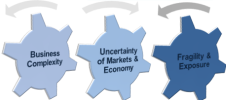About Complexity
Excessive complexity is a HUGE threat to our civilization.
That is a pretty big bold claim but, probably, not entirely unexpected coming from the guy who has set up a new company to deliver complexity solutions in UK!!!
SO the best I can do is attempt to justify the statement. The problem with that is two-fold:
Complexity as the name suggests is a pretty complex topic
Complex problems require complex solutions
Keeping an audience engaged sufficiently long to be able to explain and illustrate both the problem and the solution is a big ask. Especially when complexity as a threat sounds like something created to justify enormous fees for smug Consultants. So to give myself a chance I felt it best not to pull my punches and call it as OTHERS have seen it…Complexity IS a huge threat to our civilization.
Understandably, anyone (even my own family members) reading literature produced by me or my colleagues at Ontonix across the Globe is entitled to take our words on the subject “with a pinch of salt” because, at the end of the day we are about selling our solutions. Nevertheless, apart from providing access (links) to documents from a wide variety of sources that cover the subject, I will, firstly, give you a gentle introduction from my own “fair hand”.
This makes very good sense to me as, unlike so many of my colleagues – who come from science, mathematical, IT, Academic, aerospace and automotive design, engineering, etc. backgrounds – I came to the subject from an insurance (broking) environment. So whilst I had knowledge and experience of dealing with risk I have had much to learn…about problem AND solution!
As someone who is rarely stuck for something to say, particularly when it comes to subjects that I feel passionate about, this personal blog, pretty well, tracks my “growth” in the subject. Being a blog it isn’t too heavy, hopefully, will generate the odd smile and is not overly technical. The bulk of the items are related: risk; risk exposure; transparency; business change; economic climate; banking reform; sustainability; collaboration; innovation; insurance broking…you get the picture I’m sure. You certainly will do if you take the time to read some of this output.
I could provide links to a wide range of Ontonix corporate marketing literature and if that is what you want please drop me an email and I shall gladly oblige. But I have prepared a summary document that is not intended to be “Complexity for dummies” rather a simple man’s summary of the Ontonix perspective – what, who, how and why:
IF you want insight in the form of PowerPoint presentations we will not disappoint!
Focus: Engineering & Healthcare applications
Focus: UK, BPI, Self-rating & Banking
By the time you have waded through that lot you will have a pretty thorough grasp of the Ontonix definition of the problem and solutions for a variety of environments. BUT there are plenty of other “scholars” who have had their say about Complexity and/or its impact…so many that it may merit a separate page, so keep your eyes peeled for that addition in due course.
I have accumulated a considerable quantity of information on the subject and am happy to share it with anyone needing more information. HOWEVER, I should just draw your attention to a couple of “interesting” points to look out for as you delve deeper into the murky world of complexity.
What is the definition of complexity?
How is complexity measured?
What information is required to determine complexity?
How is complexity managed?
What are the recommended solution(s)?
Some major firms have recognised that complexity can be a major source of risk. They have “stalked” CEO’s and other C- level Executives across the Globe with examples of it’s impact and asked probing questions about their organisation.
IBM & McKinsey have both published papers in recent times but it is not terribly clear how complexity was defined. No matter because, from the responses, it must be pretty scary because “Business Leaders” seem terrified! In their shoes I would be more afraid of the cost of consultancy, IT and lost employee hours required to collate the additional data required to tackle a subject in the manner either firm suggest.
AT Kearney the Global Consultancy firm have a much better understanding of the nature of the problem and have even gone so far as to talk figures: How much does complexity really cost?
The achievable financial benefits of managing complexity – although I am unclear whether the 5% financial improvement is calculated after paying for the army of “complexity drones” that would be required to deal with the problem in the manner they prescribe!
They have even prepared a really interesting presentation detailing study results.
Want to know about complexity science and get to grips with Complexity in the Social or Cultural domain? Sociology & complexity science
There is a vast, accessible and growing library of papers and comments on the subject. Much of it is inconclusive and, to the best of my knowledge, all of it is qualitative…with the exception of the numerous, brief, success stories available on the Ontonix website. However, I would recommend this is the article for a pretty straightforward introduction to what, for many, remains a pretty abstract concept: Complexity in the physical world











